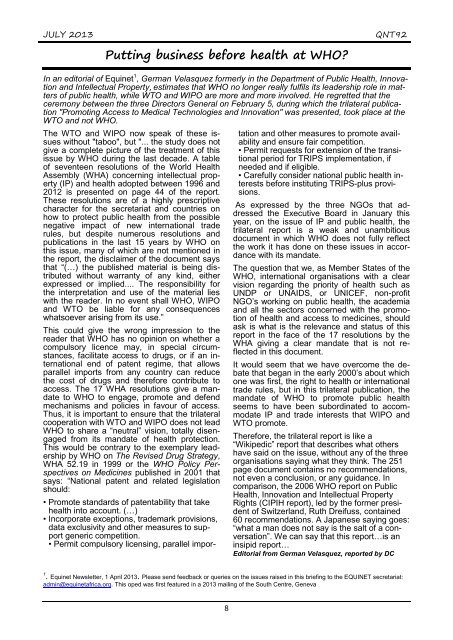World Health Day 2013 (3April) - World Health Organization
World Health Day 2013 (3April) - World Health Organization
World Health Day 2013 (3April) - World Health Organization
Create successful ePaper yourself
Turn your PDF publications into a flip-book with our unique Google optimized e-Paper software.
JULY <strong>2013</strong><br />
QNT92<br />
Putting business before health at WHO?<br />
In an editorial of Equinet 1 , German Velasquez formerly in the Department of Public <strong>Health</strong>, Innovation<br />
and Intellectual Property, estimates that WHO no longer really fulfils its leadership role in matters<br />
of public health, while WTO and WIPO are more and more involved. He regretted that the<br />
ceremony between the three Directors General on February 5, during which the trilateral publication<br />
"Promoting Access to Medical Technologies and Innovation" was presented, took place at the<br />
WTO and not WHO.<br />
The WTO and WIPO now speak of these issues<br />
without "taboo", but "... the study does not<br />
give a complete picture of the treatment of this<br />
issue by WHO during the last decade. A table<br />
of seventeen resolutions of the <strong>World</strong> <strong>Health</strong><br />
Assembly (WHA) concerning intellectual property<br />
(IP) and health adopted between 1996 and<br />
2012 is presented on page 44 of the report.<br />
These resolutions are of a highly prescriptive<br />
character for the secretariat and countries on<br />
how to protect public health from the possible<br />
negative impact of new international trade<br />
rules, but despite numerous resolutions and<br />
publications in the last 15 years by WHO on<br />
this issue, many of which are not mentioned in<br />
the report, the disclaimer of the document says<br />
that “(…) the published material is being distributed<br />
without warranty of any kind, either<br />
expressed or implied.... The responsibility for<br />
the interpretation and use of the material lies<br />
with the reader. In no event shall WHO, WIPO<br />
and WTO be liable for any consequences<br />
whatsoever arising from its use.”<br />
This could give the wrong impression to the<br />
reader that WHO has no opinion on whether a<br />
compulsory licence may, in special circumstances,<br />
facilitate access to drugs, or if an international<br />
end of patent regime, that allows<br />
parallel imports from any country can reduce<br />
the cost of drugs and therefore contribute to<br />
access. The 17 WHA resolutions give a mandate<br />
to WHO to engage, promote and defend<br />
mechanisms and policies in favour of access.<br />
Thus, it is important to ensure that the trilateral<br />
cooperation with WTO and WIPO does not lead<br />
WHO to share a “neutral” vision, totally disengaged<br />
from its mandate of health protection.<br />
This would be contrary to the exemplary leadership<br />
by WHO on The Revised Drug Strategy,<br />
WHA 52.19 in 1999 or the WHO Policy Perspectives<br />
on Medicines published in 2001 that<br />
says: “National patent and related legislation<br />
should:<br />
• Promote standards of patentability that take<br />
health into account. (…)<br />
• Incorporate exceptions, trademark provisions,<br />
data exclusivity and other measures to support<br />
generic competition.<br />
• Permit compulsory licensing, parallel importation<br />
and other measures to promote availability<br />
and ensure fair competition.<br />
• Permit requests for extension of the transitional<br />
period for TRIPS implementation, if<br />
needed and if eligible.<br />
• Carefully consider national public health interests<br />
before instituting TRIPS-plus provisions.<br />
As expressed by the three NGOs that addressed<br />
the Executive Board in January this<br />
year, on the issue of IP and public health, the<br />
trilateral report is a weak and unambitious<br />
document in which WHO does not fully reflect<br />
the work it has done on these issues in accordance<br />
with its mandate.<br />
The question that we, as Member States of the<br />
WHO, international organisations with a clear<br />
vision regarding the priority of health such as<br />
UNDP or UNAIDS, or UNICEF, non-profit<br />
NGO’s working on public health, the academia<br />
and all the sectors concerned with the promotion<br />
of health and access to medicines, should<br />
ask is what is the relevance and status of this<br />
report in the face of the 17 resolutions by the<br />
WHA giving a clear mandate that is not reflected<br />
in this document.<br />
It would seem that we have overcome the debate<br />
that began in the early 2000’s about which<br />
one was first, the right to health or international<br />
trade rules, but in this trilateral publication, the<br />
mandate of WHO to promote public health<br />
seems to have been subordinated to accommodate<br />
IP and trade interests that WIPO and<br />
WTO promote.<br />
Therefore, the trilateral report is like a<br />
“Wikipedic” report that describes what others<br />
have said on the issue, without any of the three<br />
organisations saying what they think. The 251<br />
page document contains no recommendations,<br />
not even a conclusion, or any guidance. In<br />
comparison, the 2006 WHO report on Public<br />
<strong>Health</strong>, Innovation and Intellectual Property<br />
Rights (CIPIH report), led by the former president<br />
of Switzerland, Ruth Dreifuss, contained<br />
60 recommendations. A Japanese saying goes:<br />
“what a man does not say is the salt of a conversation”.<br />
We can say that this report…is an<br />
insipid report…<br />
Editorial from German Velasquez, reported by DC<br />
1<br />
. Equinet Newsletter, 1 April <strong>2013</strong>. Please send feedback or queries on the issues raised in this briefing to the EQUINET secretariat:<br />
admin@equinetafrica.org. This oped was first featured in a <strong>2013</strong> mailing of the South Centre, Geneva<br />
8
















